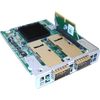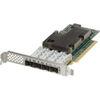Only 10 Left In Stock! Buy Now!
Factory Sealed
10 Left
• Brand new
Factory Sealed products are new, in original manufacturer packaging, and carry a manufacturer warranty.
Compare At
$210.00
$200.00
Free Shipping!
Intel
XL710QDA2OCP
Intel XL710QDA2OCP Dual Port 40/10GbE QSFP+ Ethernet Server Adapter - OCP Form Factor - Plug-in Card
Industry-leading, energy-efficient design for 10/40GbE performance and multi-core processors. The Intel Ethernet Network Adapter XL710 for OCP is part of the Intel Ethernet 700 Series, and offers 10/40GbE port speeds. Intel Ethernet 700 Series Network Adapters are the foundation for server connectivity, providing broad interoperability, critical performance optimizations, and increased agility for Telecommunications, Cloud, and Enterprise IT network solutions. Multiple speeds and media types for broad compatibility backed by extensive testing and validation. Intelligent offloads and accelerators to unlock network performance in servers with Intel Xeon processors. Both Kernel and Data Plane Development Kit (DPDK) drivers for scalable packet
View specifications
Product Review
Customer Review
5 *
___________________
0
4 *
___________________
0
3 *
___________________
0
2 *
___________________
0
1 *
___________________
0
0 Reviews from Customers
March 30, 2025 by Aitasha I.
March 30, 2025 by Michael K.
March 28, 2025 by James A.
March 28, 2025 by Andrea H.
March 25, 2025 by Josh C.
March 19, 2025 by Elden W.
Display Options Sort Reviews Highest to Lowest Newest to Oldest Oldest to Newest Lowest to Highest Favorite Reviews
Intel XL710QDA2OCP
Intel XL710QDA2OCP Dual Port 40/10GbE QSFP+ Ethernet Server Adapter - OCP Form Factor - Plug-in Card
General Model Number XL710QDA2OCP
Product Name Intel XL710QDA2OCP Dual Port 40/10GbE QSFP+ Ethernet Server Adapter
Product Type Network Card
System Interface Type PCIe 3.0 (8.0 GT/s)
Data Rate Per Port 40/10GbE
Port Configuration Dual
Speed and Slot Width 8.0 GT/s x8 lanes
Controller Intel Ethernet Controller XL710
Vertical Segment Server
Cable Medium Copper
Cabling Type QSFP+ Direct Attach Copper Cable (Twinaxial)(1-7m) / 40GBASE-SR4 Optics also supported (Purchase Intel branded optics separately)
Bracket Height OCP form factor (Mezz 2.0 Design Spec)
Connectivity Technology Wired
Intel Virtualization Technology for Connectivity On-chip QoS and Traffic Management, Flexible Port Partitioning, Virtual Machine Device Queues (VMDq), PCI-SIG SR-IOV Capable
iWARP/RDMA No
Advanced Technologies Intel Data Direct I/O Technology, Intelligent Offloads
Storage Over Ethernet iSCSI, NFS
Network / Transport Protocol TCP/IP, UDP/IP, iSCSI, SMB, NFS
Remote Management Protocol SNMP, RMON
Protocols Web, SNMP, Telnet
Form Factor Plug-in card - low profile
Warranty Warranty: Manufacturer Warranty. For defective returns, Tech For Less will give you a full refund and will arrange for and pay all shipping costs.
Read overview
User Reviews
No User Reviews available at this time
Click
here if you would like to submit your own review for this item.
Intel
Intel QME73628220CK True Scale Fabric Host Channel Adapter (HCA) Mezzanine Card - SFP
Read More $18.97
Intel
Intel EXPX9501AT 1-Port RJ-45 PCI Express 10 Gigabit AT Server Adapter
Read More $105.97
Dell
Dell J3D14 Broadcom 57404 25GB Full Height Network Card - 4-port - SFP28
Read More $208.97
Intel XL710QDA2OCP Dual Port 40/10GbE QSFP+ Ethernet Server Adapter - OCP Form Factor - Plug-in Card
XL710QDA2OCP
XL710QDA2OCP
735858319089
XL710-QDA2
Networking,Ethernet / Network / Wireless Cards,
instock
The Tech For Less Advantage:
Over 2 Million Satisfied Customers Since 2001
All Items are Inspected by Experienced Technicians
Most Include Manufacturer Warranty
30-Day Return Policy
Same Day Shipping
Contact Us
1610 Garden of the Gods Rd.
Sales: 1.866.880.1230
Operating Hours
Monday — Friday
Testimonials
This is the third time I have purchased an item [all Open Box] and I was very pleased with the price, number of ...
David` D. -
Mar 9th 2025
Read
4,227
More Reviews!
*The Compare At price is the lowest price we've recently found on the Web from another reputable merchant and can include a shipping cost.

 10 Left
10 Left











